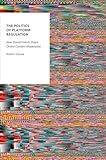The politics of platform regulation : how governments shape online content moderation / Robert Gorwa.
Publisher: New York, NY : Oxford University Press, [2024]Edition: First editionDescription: xi, 237 pages : illustrations ; 24 cmContent type:- text
- unmediated
- volume
- 9780197692851
- 9780197692868
| Item type | Current library | Status | Barcode | |
|---|---|---|---|---|
 Open Access Books - Publishers
Open Access Books - Publishers
|
National Law School | Available | OABP446 |
Includes bibliographical references and index.
Governance by platforms : definitions, histories, concepts -- Regulating platform companies : a cross-domain policy overview -- Explaining government intervention in content moderation -- "What Is illegal offline, should be illegal online" : the development of the German NetzDG -- After Christchurch : diverging regulatory responses in New Zealand and Australia -- From coast to coast : state-level platform regulation in the United States -- Platform regulation and the majority world.
"As digital platforms have become more integral to not just how we live, but also to how we do politics, the rules governing online expression, behavior, and interaction created by large multinational technology firms-popularly termed 'content moderation,' 'platform governance,' or 'trust and safety'-have increasingly become the target of government regulatory efforts. This book provides a conceptual and empirical analysis of the important and emerging tech policy terrain of 'platform regulation.' How, why, and where exactly is it happening? Why now? And how do we best understand the vast array of strategies being deployed across jurisdictions to tackle this issue? The book outlines three strategies commonly pursued by government actors seeking to combat issues relating to the proliferation of hate speech, disinformation, child abuse imagery, and other forms of harmful content on user-generated content platforms: convincing, collaborating, and contesting. It then outlines a theoretical model for explaining the adoption of these different strategies in different political contexts and regulatory episodes. This model is explored through detailed case study chapters-driven by a combination of stakeholder interviews and new policymaking documents obtained via freedom of information requests-looking at policy development in Germany, Australia and New Zealand, and the United States"-- Provided by publisher.
There are no comments on this title.
